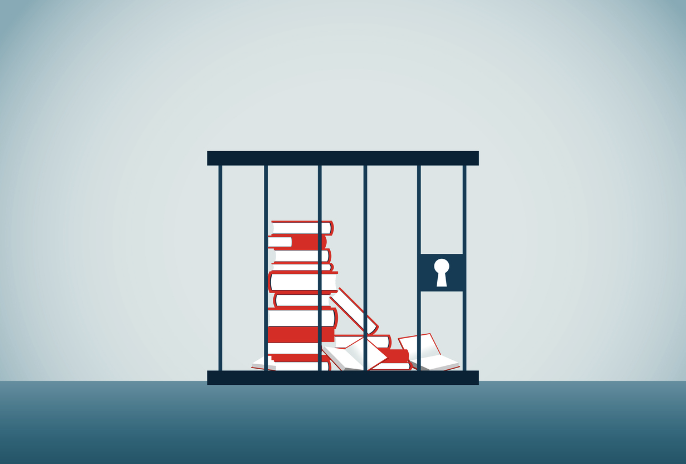In 1637, Thomas Morton’s “New English Canaan” became the first book to be banned in the U.S. due to its criticism of the Puritans. Throughout American history, book banning, both by school districts and state governments, has been a frequent occurrence, despite the First Amendment protections of free press.
“It was such an important thing in our Constitution that freedom of the press was guaranteed,” author and history professor at University of California Berkeley Thomas Laqueur said. “That’s because [in] most other parts of the world it wasn’t and it still isn’t.”
Nonetheless, book banning has been on the rise in America. In 2023, there was a 33% increase in books banned compared to the 3,362 books banned in the 2022-2023 school year, according to PEN America, an advocacy group for writers and literature. The majority of these books are about people of color, the LGBTQ+ community and topics of well-being or health.
While most book banning occurs in southern states, according to PEN America, it is omnipresent throughout the country, with notable incidents occurring in states like Pennsylvania, Virginia and Utah. The spread of censorship has been backed by parent rights organizations, one of the most prominent being Moms for Liberty, who fight for more parental involvement in schools.
These parents’ rights groups go to school board meetings to protest certain books that they deem inappropriate. They use what many describe as fear tactics, claiming that there is “porn in schools” and that the books they are banning are “indoctrinating” or “grooming” children.
While these groups have mainly been targeting school libraries, bannings and challenges of books in public libraries have increased. Between January and August of 2023, almost half of all book challenges have been in public libraries. In many conservative states, or states with a larger presence of parent rights groups, public libraries are at risk of being defunded or even closed if they refuse to ban a book that has been challenged.
This, however, is not the case in Washington D.C. “If [clientele] come in and ask for a book, they get the book,” D.C. Public Librarian Janna Tanner said. The D.C. The Public Library System (DCPL) allows people to challenge books that they object to.
“We do not exclude materials based on their origins, their backgrounds or the views they express… we don’t participate in book banning,” Tanner said. However, even with D.C.’s liberal stance on book banning, the D.C, Maryland and Virginia area is not safe from the spread of book banning.
In Virginia, Fairfax County Public Schools temporarily removed “Gender Queer” by Maia Kobabe and “Lawn Boy” by Jonathan Evison, due to claims by parents that they contained pedophilia and pornographic content. They were reviewed by a committee that decided the books did not contain inappropriate sexual material, and they were returned to the library. The same books were banned in Loudoun County, but the ban was upheld there by the reviewing committee. Additionally, DCPL reported a 38% increase in book challenges in D.C. in 2022 compared to 2021.
Much of the fear leading to book bannings around the country stems from the misconception that young audiences are being exposed to ideas or content they aren’t mature enough to understand. However, WIS faculty stresses that teachers go through a lengthy and thoughtful process to make sure the books they are choosing are age-appropriate, contain important themes and ideas and are taught in a way that won’t harm anyone.
“I think we are all really conscious of a balancing act that is happening: who our students are, what is their experience, what is their age level and what types of texts could be a good challenge,” upper school English teacher Karin Tooze said.
Despite the thought that goes into choosing the English curriculum, Tooze recognized that even if a book may be age-appropriate, it still may be triggering for some people. In this situation, she says that the teacher should make sure the student feels comfortable through various steps, such as allowing them to skip a certain section, having a conversation with them to prepare them to read it, proposing a different book for them to read or, if absolutely necessary, switching the book for the whole class.
WIS is a small school with small English classes. “Even in a class of 30 students I would probably have that knowledge [that a book is triggering for a certain person],” Tooze, who has worked at larger public schools for most of her career, said.
Upper school English teacher Nicholas Loewen has never received an objection to a WIS English curriculum book. “I think [it is] in part because we teach books that are recognized as quality, high-level literature and therefore they are for adults and they are going to have adult things in them,” Loewen said.
However, there have been “a number” of objections to books in the library, according to Research and Media Specialist Lauren Olson. “When someone has a concern about a library material, we have a request for reconsideration,” Olson said. “…typically the librarian will have a conversation with them to say, ‘we understand all of this, we chose this book because of this, we understand if you don’t want your child to take it, but we feel it’s appropriate for everyone else to have it.’”
Book banning has an impact not only on readers but also on authors. According to PEN America, 88% of books banned in 2022 and 2023 were young adult or children’s books. “[Authors] are unable to make that very important connection with [their] readers,” Nana Howton, author of “Saisons des Feux” (Burning Seasons), said.
Alternatively, another major effect of book banning on authors is self-censorship, according to Laqueur. Authors become less exploratory or less controversial in order to avoid having their book banned. Self-censorship can worsen a book’s quality and lead to more and more books that lack thought-provoking substance.
“I grew up in a dictatorship where books were banned, and I didn’t have access to some books that I wanted to read,” Howton said. “In a way, we missed a lot for not having access to all books in general. You start censoring one kind of book, and then you object to another kind and another kind, and pretty soon it’s “Fahrenheit 451.” Pretty soon you are banning everything.”

































































